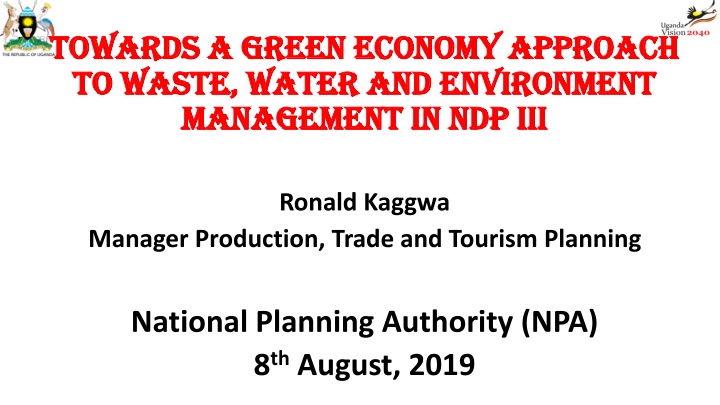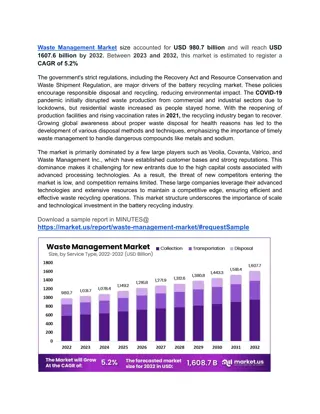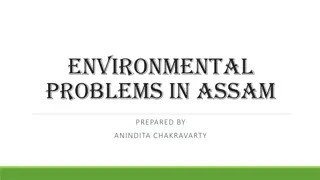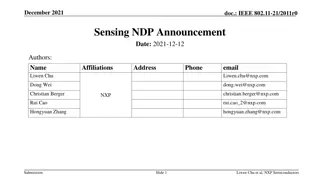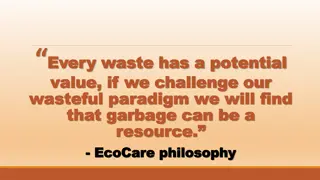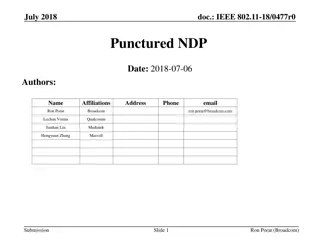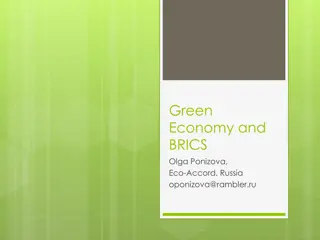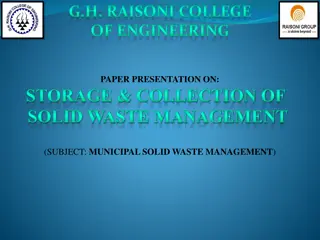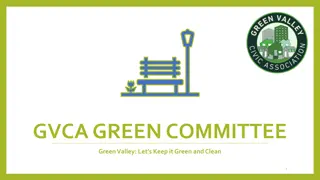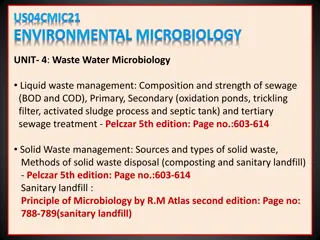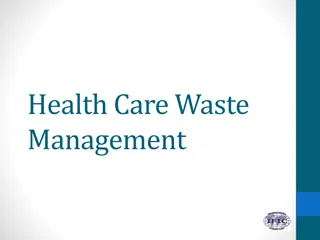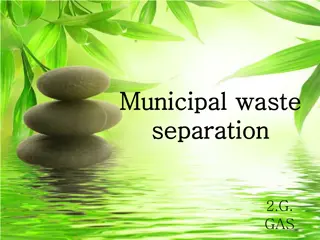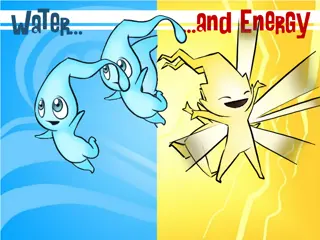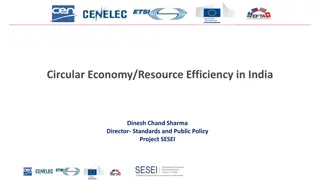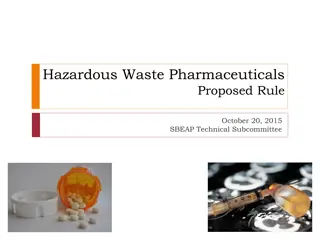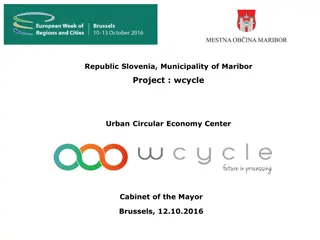Green Economy Approach to Waste, Water, and Environment Management in NDP III
Ronald Kaggwa, Manager of Production, Trade, and Tourism Planning at the National Planning Authority, discusses the implementation of a green economy approach towards waste, water, and environment management in NDP III. The focus is on sustainable practices and strategies to promote environmental conservation and resource efficiency.
Download Presentation

Please find below an Image/Link to download the presentation.
The content on the website is provided AS IS for your information and personal use only. It may not be sold, licensed, or shared on other websites without obtaining consent from the author.If you encounter any issues during the download, it is possible that the publisher has removed the file from their server.
You are allowed to download the files provided on this website for personal or commercial use, subject to the condition that they are used lawfully. All files are the property of their respective owners.
The content on the website is provided AS IS for your information and personal use only. It may not be sold, licensed, or shared on other websites without obtaining consent from the author.
E N D
Presentation Transcript
Towards a Green economy approach Towards a Green economy approach to Waste, water and environment to Waste, water and environment management in management in ndp ndp iii iii Ronald Kaggwa Manager Production, Trade and Tourism Planning National Planning Authority (NPA) 8thAugust, 2019
Key Issues, Questions and Concerns Key Issues, Questions and Concerns The NDP III proposed strategic direction Waste, Water and Environment in the context of NDP III Opportunities for enhancing the contribution of waste, water and environment to NDP III through a green economy approach 2
The NDP III Proposed Strategic Direction The NDP III Proposed Strategic Direction Goal: Increased Household Income & improved quality of life(29) to be pursued through industrialization. Theme: Sustainable Industrialization(30) for inclusive growth, employment and wealth creation. 3
The NDP III Proposed Strategic Direction NDP III Strategic Objectives 1) Enhance value addition in Key Growth Opportunities(6) 2) Increase the Stock & Quality of Productive Infrastructure(7) 3) Increasing productivity, Inclusiveness and wellbeing of population(8) 4) Strengthening the Private sector to drive economic growth(9) 5) Strengthening the role of the public sector in the growth and development process 4
The NDP III Proposed Strategic Direction The NDP III Proposed Strategic Direction NDPIII proposes a shift from sectoral planning to a programmatic approach with 15 proposed programs linked to the 5 key objectives 5
The NDP III Proposed Strategic Direction The NDP III Proposed Strategic Direction Waste, Water and Environment in the context of NDP III Industrialization is the focus for the next ten years of our development journey and for NDPIII Industrialization will drive take-off and wealth creation by: Adding value to local resources and increase demand for agricultural commodities Create jobs for unskilled or semi-skilled workers Improve trade balance through export of processed goods Reverse deforestation and wetland degradation by providing alternative livelihoods and increased income Industrialization will also facilitate value addition in Key Growth Opportunities i.e. Agric., Minerals, Oil and Gas 6
Implications of Resource led industrialization Implications of Resource led industrialization Waste Industrialization will change the composition and increase the volume of waste e.g. electronic waste, chemical waste, oil and gas waste, nuclear waste, plastic waste, paper waste, industrial waste, metallic waste, waste water, construction debris, medical and health care waste and organic waste bio-degradable organic waste accounted for 88.5% of urban solid waste composition in 1990 but this share decreased to 72% in 2014. Rapidly changing waste profile depends on consumption patterns, life styles and the industrial and economic activities Industrialization will increase the generation of waste (Solid waste, effluent) How do we manage the increasing and changing waste to minimize pollution (air, water and land pollution)? 7
Implications of Resource led industrialization Implications of Resource led industrialization Only 68% of the solid waste generated in urban areas is collected and safely disposed. Urban waste for KCCA between 1990 and 2014 Type of Waste Organics waste) Plastics Glass Metal Textiles Paper & board Tree cuttings Total 1990 88.5 2001 83.5 2006 73.1 2014 72.0 (green waste/food 1.6 0.9 3.1 0.4 4.0 1.5 100 1.6 0.9 2.6 0.5 8.0 2.9 100 11.8 1.8 0.4 1.0 10.6 1.3 100 12.4 2.0 0.4 1.5 10.2 1.5 100 8
Implications of Resource led industrialization Implications of Resource led industrialization Water Industrialization will increase the demand for water Water for production Irrigation with potential to contribute UGX 46.8 billion per year is a raw material for beverage industries a coolant for industrial machinery and reservoir for discharging industrial waste. Water is the major input in agriculture and therefore increased agricultural productivity Water for generation of HEP, the engine of industrialisation Water for the Fish industry Water for Minerals, Oil and Gas Water for Transport 9
Implications of Resource led industrialization Implications of Resource led industrialization Environment Pressure on the country s environment and natural resource base Overuse and degradation of the ENR base Raw materials to the drive the resource led industrialization agenda Sink for industrial waste Victim of industrial pollution On a positive note, it may bring the innovations and technology 10
The Uganda Green Growth Development Strategy Uganda has developed a Green Growth Development Strategy (UGGDS) aligned to national development priorities as contained in the Uganda Vison 2040 and NDP II. Responding to the country s international commitments. It identifies key interventions in transport, agriculture, natural resources, energy and green cities for implementation to catalyze the transition to a green economy 11
Green Economy in the Ugandan Context Green Economy in the Ugandan Context Maintain and enhance the country s natural capital as the engine of economic growth and social transformation promote value addition to natural capital Inclusive growth, poverty eradication that ensures Prosperity For All Green jobs and decent work for all (especially the youths and women) Resilience to climate change (climate resilient growth) and disaster preparedness Low carbon emission climate resilient development pathway Sustainable urbanization Resource use efficiency Technology and innovations 13
Opportunities of Green Economy to resource led industrialization Opportunities of Green Economy to resource led industrialization Waste, Water and Environment have strong linkages with the transition to a green economy. Waste is an asset or resource for production and wealth creation 80% of the waste generated in Uganda is organic presenting opportunities: Promote resource use efficiency reuse and recycling of waste Waste to wealth initiatives e.g. generation of Biogas Energy Enhanced access to innovative technologies Partnerships Creation of green jobs
THANK YOU! THANK YOU! 15
